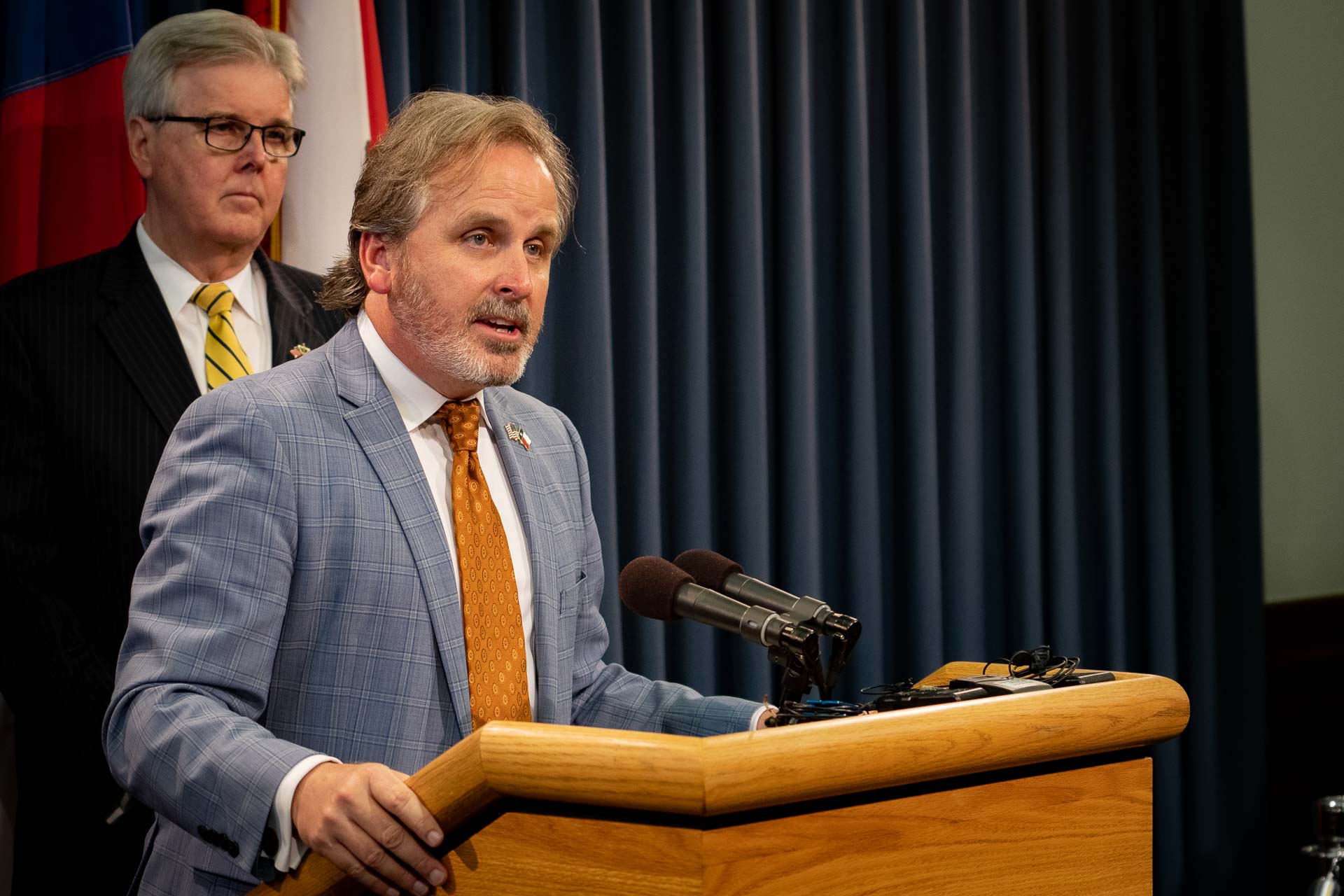
‘Fiduciary Responsibility’: The Two Words at the Center of the ESG Fight in Texas
The table is set for a second wave of legislation taking aim at ESG in the Texas Legislature. Austin, TX, 43 mins ago — During the lengthy Senate State Affairs Committee hearinglast December on state pensions and the Environmental, Social, and Governance (ESG) movement in finance, one phrase was thrown around more than any other with little agreement on its implication: “fiduciary responsibility.”
Momentum toward further rebuke of ESG — a financial scoring system for companies based on their adherence to certain progressive ideals such as support of a net-zero carbon transition or opposition to abortion restrictions — is building in the Texas Legislature, now approaching a crescendo during this 88th regular session.
Last session, the state laid the groundwork by passing Senate Bill (SB) 13; that law requires the Texas Comptroller of Public Accounts to compile a pension divestment list of companies deemed to be divesting from or sanctioning fossil fuels. Any pension dollars tied to those companies on the list — either through direct investments or exchange-traded funds — are to be removed and reinvested elsewhere.
The inaugural version of the list published in August features global corporations like BlackRock and Credit Suisse Group. Both the Teachers Retirement System and the Employee Retirement System — the state’s two largest pensions — had direct or indirect holdings in all 10 of the companies on the list.
With that in place, the legislative and executive branches now look for more acute and tailored responses to the existence and pervasiveness of the credit score across the financial industry, along with its ancillaries.
Texas Attorney General Ken Paxton has gone on the issue offensive on multiple fronts; in conjunction with other red state attorneys general, Paxton is investigating BlackRock, S&P Global, and six banks for alleged violations of consumer protection laws. He and 24 other states have also sued the federal government over a proposed regulation at the Department of Labor that would allow or even encourage asset managers to consider “nonfinancial factors” in directing the investments they oversee.
In non-finance speak, that means the guardrails within which money handlers operate may expand to more acutely encompass factors that are not explicitly financial — climate change posture and abortion support policy would join historic financial returns and stock performance in assessing investment opportunity.
The rule is, in effect, a reshaping of the definition of “fiduciary responsibility” in the government’s eyes.
Legally, a fiduciary, the individual or group advising or handling the investments, has a duty to act in the best financial interest of its clientele. The debate about this definition centers not on its validity, but on what is materially and measurably germane to someone’s “financial best interest.”
The traditional view of that definition expands only to strict financial implications and nothing more — only that which will yield the highest dividend, with variation coming mainly in short, medium, or long-term priority.
But the alternative view, one that has become increasingly ubiquitous among certain enclaves in recent years, is that the financial best interest moves beyond dollars and cents. To use climate and energy as an example, the thought line is that a more “sustainable” future — often narrowly defined as begetting a transition to a renewable-powered economy — is ultimately as or more impactful on the long-term financial well-being of investors than the soundness of a business or investment.
Put another way, for those of this newer view, “return on investment” — the financial gauge central to everything in the business world — extends to more than just the ability of earnings to outpace costs.
Risk is already accounted for in investment and insurance circles. Whereas historical hurricane frequency and severity in Houston are measurable risk factors, calculating the effect of “climate change” broadly speaking on those incidents 40 years down the road is far more difficult, if not impossible.
It largely boils down to the shareholder versus stakeholder focus dynamic. If a company focuses on its shareholders more than anything else, its priority lies with those who have financial skin in the game through direct investments. But increasingly more weight is being thrown behind the stakeholder focus, that the direction and internal policies of a company should account for opinions outside the rank and file shareholders to all those with an interest in the company or its actions.
This divergence of “fiduciary responsibility” opinion is the root of the fight over ESG. The ESG grading system, which directly and indirectly influences the flow of capital to certain sectors of the economy over others, is an attempt to introduce specific political causes into the investment calculus.
It also played out during the Senate hearing with committee Republicans and corporate financial manager representatives talking past one another over fiduciary responsibility and what it entails.
There was little squaring of that circle.
BlackRock has become the poster child in the broader fight over ESG, not the least because it’s the world’s largest asset manager. Its CEO Larry Fink has also ensured that both BlackRock and ESG are synonymous within Republican circles with his frequent public statements.
BlackRock’s situation is a curious one: it manages hundreds of billions in oil and gas investments across the nation — $93 billion in Texas as of a year ago — while it publicly touts the push for global “decarbonization.”
At a Clinton Global Initiative gathering last September, Fink said, “The tectonic shift [toward decarbonization] is happening. We are seeing big shifts because of heat and drought — we’re seeing every day that climate risk is investment risk and people are waking up to that.”
Yet when it comes to its proxy vote record — a practice that entails an asset manager voting on a company’s shareholder proposals on behalf of their clients — the financial titan received a 24 percent ESG score according to ShareAction, an ESG-supportive non-profit that tracks such records.
That’s the lowest score of the 10 companies on the Texas comptroller’s list of fossil fuel “divestors,” ranking 62 out of the 68 assessed. The top 12 entities are all European.
Proxy voting is the next battlefield on the issue. Texas’ largest two pension systems came under fire last year after the Employees Retirement System proxy voted for five different proposals to spurn fossil fuel financing and the Teachers Retirement System supported a measure calling for counteraction of state abortion restrictions.
Responsibility for both sets of votes was placed on Institutional Shareholder Services, one of the largest proxy advisors then used by both pensions.
But even without being the ESG score pacesetter, BlackRock still illustrates a shift in investment strategy; a Reuters analysis showed that in 2018 and 2019 the company backed only 10 percent of “climate-related shareholder proposals,” a ratio that grew after receiving pushback from climate activists.
It’s not a one-to-one comparison, but BlackRock voted for 47 percent of climate and social shareholder proposals in 2021. In the middle, BlackRock signed onto the “Climate 100” agreement, an initiative that aims to “ensure the world’s largest corporate greenhouse gas emitters take necessary action on climate change.”
BlackRock announced $230 billion in net inflows during 2022 within the U.S. After the Texas pensions’ respective votes for controversial shareholder proposals and continued criticism of its actions, BlackRock announced a new procedure to allow pension systems to vote their shares differently than what the company’s proxy vote service suggests if there is disagreement. It was one of the first such policies when announced, and Vanguard has since followed suit with its own version.
During the December hearing, state Sen. Bryan Hughes (R-Mineola), chair of the State Affairs Committee, rhetorically elbowed BlackRock, saying, “BlackRock says whatever it needs to say to whoever they’re speaking to at that point in time, that’s what we’re experiencing here today.”
But ESG expands well beyond BlackRock. Multiple entities maintain their own ESG scoring systems, including the S&P 500, which tracks stock performance of the top 500 companies in the U.S.
At a recent panel with The Texan, Sen. Kelly Hancock (R-North Richland Hills) pointed out that FTX — the now defunct, but previously nascent cryptocurrency company piloted by criminal indictee Sam Bankman-Fried — had a better ESG score than ExxonMobil.
That is one of many criticisms Texas Republicans have levied against ESG broadly and the companies advancing it; another is that Texas’ economic future is tightly intertwined with the success of oil and gas both macroeconomically and financially through severance taxes.
A response is coming, it’s just a matter of its final form.
Following up on SB 13, the Texas Legislature has a plethora of ideas for continued ESG pushback at its fingertips. State Rep. Tom Oliverson (R-Cypress) has filed House Bill (HB) 1239 that’d prohibit insurance companies operating in Texas from setting rates based on ESG scores or “Diversity, Equity, and Inclusion” metrics.
State Rep. Steve Toth (R-The Woodlands) has filed HB 982 that’d require any company contracting with a governmental entity to provide written verification it doesn’t use ESG criteria, and HB 645 that prohibits financial entities from using values-based criteria when evaluating services for individuals. He’s also pledged to file legislation prohibiting Texas banks from refusing to issue loans to fossil fuel companies, though that legislation appears yet to be filed.
The Senate hearing indicates the upper chamber will too grapple with its own recourse; Lt. Gov. Dan Patrick has criticized BlackRock on the issue along with the state pension systems’ proxy votes.
Any legislative response is likely to be as complicated as the issue is itself, as accessible as the flip side of the Rosetta Stone. And at the root of the fight are two different worldviews that inform wildly different assessments of those two all-important words: “fiduciary responsibility.”
BlackRock did not return a request for comment by the time of publication.

